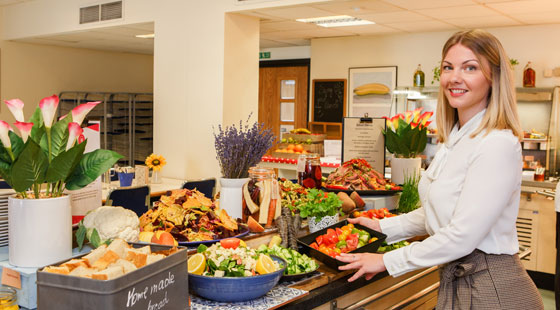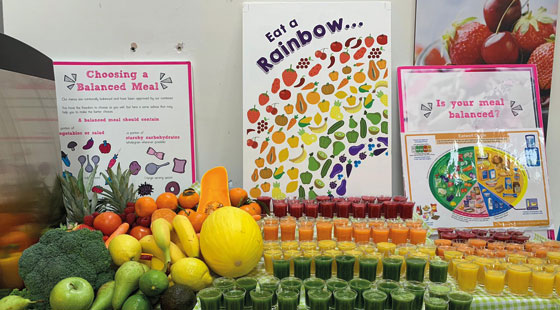Amy Roberts is a school food champion. The award-winning director of nutrition and food development at Holroyd Howe is behind a number of schemes to make
The diets and health of young people have dominated headlines over recent years, as well as being the driving force behind initiatives and legislation from government.
Fourteen years after Jamie Oliver launched his campaign to banish turkey twizzlers from school canteens, education caterers continue to pursue innovations to teach students about balanced diets and explain why they should be eating one. At the forefront of these efforts is Amy Roberts, Holroyd Howe's director of nutrition and food development, Acorn Award recipient and winner of the Foodservice Healthy Eating Champion Catey in 2018.
Holroyd Howe serves meals at approximately 150 independent schools, of which
about 50% have boarding students requiring breakfast, lunch, dinner and snacks every day.
Roberts says: "We constantly look at our approach in terms of healthy eating. We apply all nutritional guidelines to ensure menus are balanced and meet government guidelines to support pupils' optimum development.
"But we're very mindful that even if we provide lots of healthy food and lots of innovation, that doesn't mean pupils are going to make the right choices, so we also provide nutrition and food education, whether that be posters and marketing materials in the dining room or more formalised educational sessions."
Holroyd Howe directs children towards healthier options using a simple pink How to Eat Well logo, which signposts dishes that contain a starch or carbohydrate portion, a protein portion and fruit and vegetables.
The caterer's focus is on ensuring students are as well-prepared as possible for what the day holds, be it classes, exams or sports, and all its chefs receive nutritional training.
Roberts explains: "The students need fuel as they expend a considerable amount of energy. Not only are they growing and their bodies are developing, but they're very physically active, especially in independent schools, where they do a lot of exercise.
"The How to Eat Well meals are not always the lowest in calories. We don't base our menu and recipe development on making sure dishes have fewer calories or are low in fat, because a lot of the foods that children need are calorific and do contain fats. Salmon is a good example: it contains more calories than chicken, but children should be eating oily fish for the omega-3 content.
"We hear a lot about calorie labelling, both for adults in the workplace and in schools. I don't think that's the right message in the school environment. We should be encouraging children to make choices based on eating across food groups and having plenty of fruit and vegetables and starchy carbohydrates, not pushing them towards making decisions based on a number."
While calorie reduction is not a driving force, Holroyd Howe has done a lot of work around reducing sugar through its 'Half Measures' initiative (see panel), which has seen dessert recipes adapted with alternative sweeteners. A similar initiative around mid-morning snacks has also focused on substituting sugar with natural sweeteners.
Fare games
The caterer's dedicated team of nutritionists work across its schools to deliver educational sessions, and it has developed several hands-on programmes to introduce youngsters to different foods, explaining where they come from and the different ways they can be prepared. One such scheme, Peter Rabbit's Allotment, plays on the success of the 2018 film to show younger pupils how various vegetables are grown before giving them the chance to taste them in different forms, including raw, in a hot meal, as a crisp or in a smoothie. Another programme, Around the World with Holroyd Howe, sees preparatory school pupils given a passport in which they can collect stickers of flags as they try the cuisines of different countries.
A slightly messier activity is where pupils make their own energy balls, learning about the nutritional values of oats, dried fruits and seeds; and in another session, Science Café, a skeleton is taken into classrooms so Holroyd Howe staff can explain how nutrients support the body.
These programmes continue through to senior schools, where the caterer looks to support teaching staff. Roberts explains: "We spend a lot of time looking at curriculums to find out where nutrition links are and develop lessons and classes to coincide.
"We've developed a programme to support the food and nutrition GCSE in senior schools. A few years ago the curriculum changed, and food preparation and nutrition GCSEs replaced food technology, which means that now the course is more focused on nutritional science. It's all quite new, so we've put together the full GCSE content for our teachers. If they want to work with us, we can supply all lesson plans and classroom content. We'll also come in and do a couple of lessons."
Holroyd Howe also works individually with schools to support students with additional needs, such as athletes or those with dietary conditions. This extends to students entering exam periods, with sessions taking place to explain the importance of staying hydrated and eating meals that will aid concentration. For those heading off to university, lessons in cooking simple, nutritious meals are also offered.
Health by stealth
With the popularity of figures such as 'Deliciously Ella' Ella Woodward and 'the Body Coach' Joe Wicks, as well as the increasing consciousness around sustainability, it's perhaps unsurprising that Holroyd Howe is finding that it is in tune with students.
Roberts says: "Children are much more familiar with healthy eating than they used to be. They all know they should be eating fruit and vegetables, and they all know it's better to have wholegrain than white bread. It's not about hiding vegetables in food any more - they're cleverer than that and they expect more. We have to rise to that and keep pupils engaged.
"They don't want to see the same thing every day - they want to see the same food that they eat at the weekends or the food they buy from the high street, or they want to see the meals they've eaten in Thailand in the summer. These are constant factors that we consider when developing menus. How can we give them what they want and make it nutritious at the same time?"
To tackle this, Holroyd Howe's head of food innovation regularly joins with chefs from across the business to explore the food offerings of a given city before discussing how they could be made more nutritious or sustainable and produced in the school canteen. Food File Road shows also see new concepts presented to Holroyd Howe's chefs around the country, who are encouraged to take ideas and develop them in their own kitchens.
Roberts adds: "In boarding schools particularly, it's a struggle around engagement. The children come to the same environment for three meals a day, seven days a week, and it's important to inspire them. So we'll throw in a curve ball and bring in a pop-up concept or sharing platters or serve international cuisine. It's complex; nutrition is just one thing, then it's innovation and keeping them engaged."
Sustainability is a priority for the caterer and one that is also at the forefront of the minds of students. Holroyd Howe has appointed a sustainability environmental manager to looks at all aspects of the business, including packaging, food waste and the use of sustainable ingredients.
Roberts says: "We have a responsibility not to wait to be asked to do these things. We should be the ones going to schools saying we want to do this. It's amazing how many letters we've had recently from pupils asking us about things like palm oil or asking us how we're recycling. They take such a vested interest in learning about this and it's our responsibility to meet their knowledge needs and we really enjoy doing it."We never want to be just caterers, we want to work in partnership with schools. We want to be a trusted partner they can come to when they need expert advice on nutrition, sustainability and hospitality.
"We're very aware that to get healthy eating embedded it's got to come from all angles, so we're working with pupils, parents, catering teams and schools. When you get everyone on board and everybody is sharing the same message, that's when we've got more chance of both the schools and the pupils embracing it."
About Holroyd Howe
Holroyd Howe was established by Rick Holroyd and Nick Howe in 1997 as a B&I
and education caterer specialising in independent schools and colleges. The business enjoyed commercial success and was acquired by Westbury Street Holdings in 2007. Following the acquisition it became a solely education-focused caterer. It operates in approximately 150 schools across the UK, providing food to children from nursery through to sixth form. The company won the Education Caterer of the Year at the 2015 Foodservice Cateys.
Sugar strategies
Holroyd Howe's Half Measures programme was created with the aim of decreasing the amount of sugar in children's diets. The company's chefs looked
at the caterer's dessert recipes with the aim of cutting the sugar by 50%. This was achieved by replacing it with natural sweeteners from fruit, vegetables and dairy foods instead.
Holroyd Howe has also ensured that the added sugar content of its mid-morning
snack menu is no more than 10% of children's recommended added sugar intake for the day (approximately 25g a day).
This figure has been achieved as an average across a 10-day period, with Roberts
explaining that "a healthy diet is about variety and ensuring that we eat a balance of foods across a period of time."
Sample menus
Spring prep school menu
•Parsnip and potato soup
•Turkey meatballs in fresh tomato sauce or roasted vegetable quiche with a green salad
•On the side: sweetcorn and crispy new potatoes
•Dessert: fresh cut fruit and yogurt bar
•Leek and potato soup
•Seafood pie topped with herby mash or vegetable risotto with toasted seeds and basil oil
•On the side: garden peas and baked sweet potato wedges
•Dessert: seeded flapjack
Daily morning break options
•Cinnamon popcorn
•Cheddar cheese and courgette muffins
•Guacamole on wholegrain toast
•Oatmeal and raisin biscuit
•Berry and coconut tray bake
•Yogurt, oat and berry smoothie
Senior supper
Mexican: tacos or soft corn tortillas filled with grilled ancho chicken, cumin ground lamb or chilli and lime refried black beans, served with pico de gallo, chilli sauce, guacamole or pickled pink onions, as well as red rice, green beans with tomatoes, and corn with chilli and mayo.
Dessert: chocolate brioche bread and butter pudding or passion fruit and lime yogurt
Senior Saturday menu
Asian inspired: char sui pork, garlic, ginger and chilli chicken or sticky sesame tofu with sticky jasmine rice or yaki soba noodles, served with miso aubergines, pak choi, edamame beans and chilli, with an Asian broth or hot sauce.
Dessert: caramel apple blondies or avocado and chocolate mousse
Continue reading
You need to be a premium member to view this. Subscribe from just 99p per week.
Already subscribed? Log In











